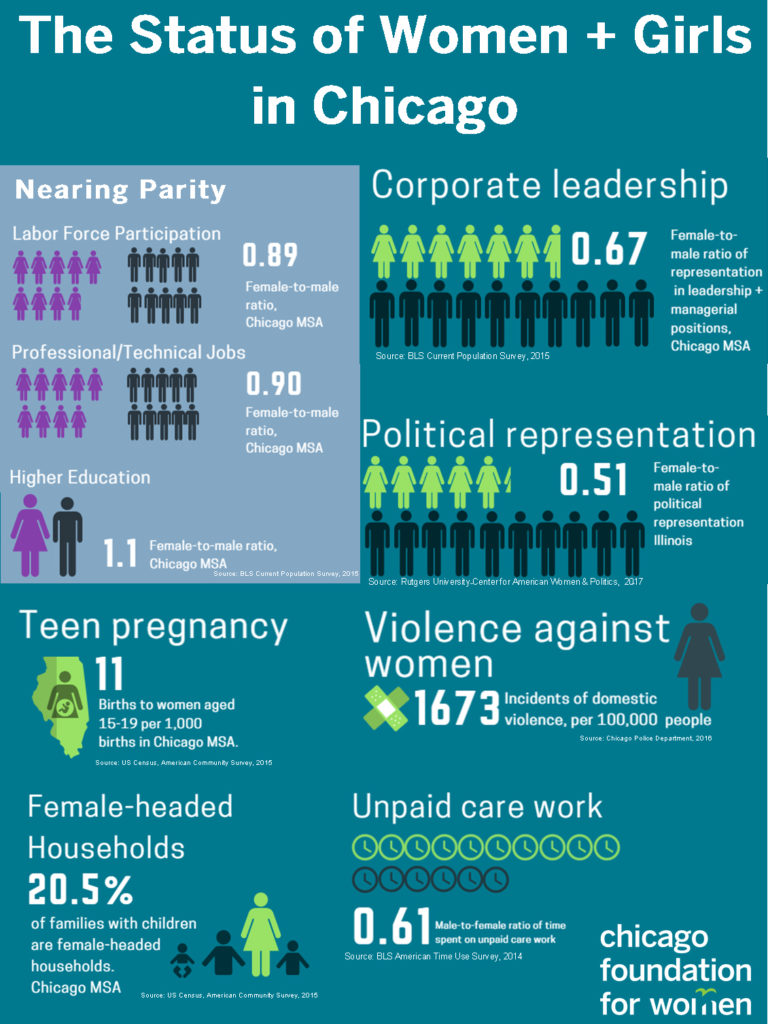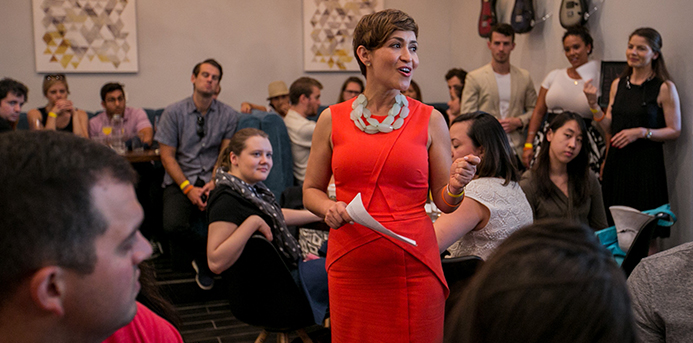“I didn’t have any relatives here, so I came only with one suitcase, my son and my dream … [of] building a new family.”
Like so many immigrant women, Yadira moved to the United States chasing a dream. That dream changed when her marriage turned abusive and Yadira found herself raising her son alone in a strange country, working in low wage or unstable jobs and trying to figure out how to build the life she had dreamed of for her family.
Yadira’s story is familiar for too many women in Chicago. Recent data compiled and analyzed by the McKinsey Global Institute and Chicago Foundation for Women shows women in Chicago are at greater risk of violence and economic insecurity and are farther from gender equity, compared to women in other cities. Chicago falls behind Philadelphia, Miami and Atlanta on key indicators of gender equity, and has the lowest score for gender equity of the country’s 10 largest metropolitan areas.

This has negative implications for women and girls, and for our region as a whole. If Chicago were to match the gender equity progress of those cities with the highest gender parity scores, it would add an additional $58 billion to our region’s economy.
In some arenas, equity is within reach. More women are graduating from college than men. Women are joining the workforce at rates nearly equal to men, and are breaking out of “pink collar” jobs to become lawyers, doctors, journalists and pharmacists.
But, for many women, supporting themselves and their family, accessing health care and information, and living free from violence is a challenge. In our region, women are victims of violence at alarming rates. Despite increasing education and career opportunities, women are still underrepresented at the tables where business and policy decisions are made. And too many women struggle to plan and support their families.
Violence Against Women
In 2016, domestic violence occurred in Chicago at a reported rate of 1,673 per 100,000 residents. That is more than 123 incidents of violence every day, with women the majority of victims. While this number gives us a sense of the scale of violence against women, it does not capture the violence that happens behind closed doors and goes unreported.
Reporting the abuse and filing a police report was Yadira’s first step. “Things were not what I expected,” she says. “I think the hardest part for me was to know that I wasn’t independent.”
Ending her marriage meant Yadira regained her financial independence. But it also meant entering the workforce in a new country.
Women in the Workplace
Women are pursuing careers in professional and technical jobs that bring with them stable salaries and benefits at rates that nearly equal men. But women aren’t advancing into leadership and managerial roles at the same rate. At the highest level, only 6 percent of Fortune 500 companies have women as CEOs, according to the Rockefeller Foundation and Global Strategy Group. In Chicago, women in management are outnumbered by men three to two.
Despite a college degree and a successful career in Mexico, Yadira found herself stuck in a cycle of temporary work in Chicago, with no insurance, no retirement savings and no opportunity for advancement.
“Living with no benefits, [you are] always scared of losing everything,” says Yadira. “It’s something that is in the back of your mind constantly. It drains you.”
Tired of the instability of freelance work, Yadira went to Upwardly Global, a nonprofit offering job training and support for skilled immigrants who are unemployed or underemployed. There, staff coached Yadira through the job search, helping to update her resume and practice her interview skills, and connecting her with job opportunities and resources.
After completing Upwardly Global’s job seeker program, Yadira found full-time work with the Nielsen rating company. “I feel better; I feel secure. And I feel that I can make plans,” she says. “I feel that I can provide for me and for my son.”
Political Representation
Women are underrepresented in leadership from the boardroom and the C-suite, to local government. The city of Chicago has not had a woman mayor since Jane Byrne’s term ended in 1983, and the state of Illinois has yet to elect a woman governor. As of this writing, there are no women in the 2018 gubernatorial race.
But, we are making progress. Women comprise 36 percent of the Illinois legislature, making our state one of the top six in the country for women, according to the National Conference of State Legislatures. Looking at political representation more broadly, including local office and all three branches of government, the number of women in politics jumps to one in two.
Women’s political engagement appears to be on the upswing. At the beginning of 2017, Chicago Foundation for Women created The 100 Day Fund to support civic engagement and participation in the historic women’s marches. In Chicago, 250,000 women and men marched through the streets in an event planned by a handful of women. Across the country, we are seeing more women than ever before express interest in organizing their community and running for public office.
Female-Headed Households
Raising her son alone after her divorce, Yadira found herself among the one in five households in Chicago headed by women. In Chicago neighborhoods like Englewood, as many as two-thirds of households are headed by single mothers.
These households are often at greater risk of economic insecurity. This year, Chicago Foundation for Women launched the Englewood Women’s Initiative to provide job training and support services that put women on the path to well-paying jobs and economic security for themselves, their families and their community.
Teen Births
In order for women to have the ability to plan careers, in business or public service, they must have the ability to plan if and when to start a family. Comprehensive sexual education, available in Illinois since 2013, and greater access to contraception have contributed to a decline in unplanned teen pregnancies since 1990, according to the Pew Research Center. The teen birth rate in Chicago, 11 per 1,000 births, is about half the national rate of 22. But progress has stalled in the past several years.
Health providers like Planned Parenthood are increasing access to birth control and long-acting reversible contraception, while organizations like Illinois Caucus for Adolescent Health are empowering young women and men to take control of their own health, to educate their peers, and to advocate for young people’s access to health care and information.
What’s Next?
What would gender equity look like for Chicago? It would mean more women in leadership, from the C-suite to political office. It would mean women would have a seat and a voice at every table. It would mean women would have full control of their health and bodies. Fewer women would struggle to support themselves and their families. And the end of all violence against women.
It won’t happen overnight, certainly, but there are ways to get us to equity sooner. We can invest in women and girls, in removing barriers and in creating opportunities for them to succeed. We can invest in women like Yadira, so that more women have the opportunity to create a safe, secure life for themselves and their families.
Earlier this year, I was among the 250,000 people in Chicago and 5 million people worldwide who participated in the Women’s March. The energy was inspiring. Moving forward, we need to build the infrastructure to convert this energy into a sustained, broad-based movement for equality. Chicago Foundation for Women is doing just that. It is the connective tissue that is holding the Chicago women’s movement together. We are prepared to go all in and lead our region toward a better and more equitable future. Join us.
Join Chicago Foundation for Women at the 32nd Annual Luncheon Thursday, Oct. 19, 2017. Learn more and reserve your spot today at cfw.org/luncheon.

